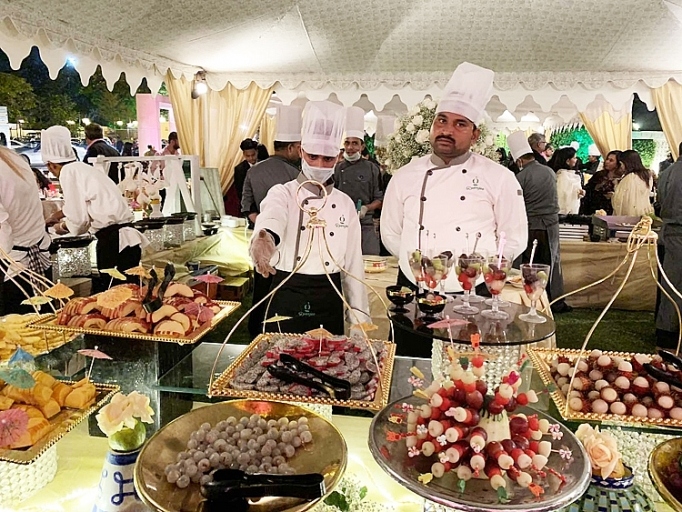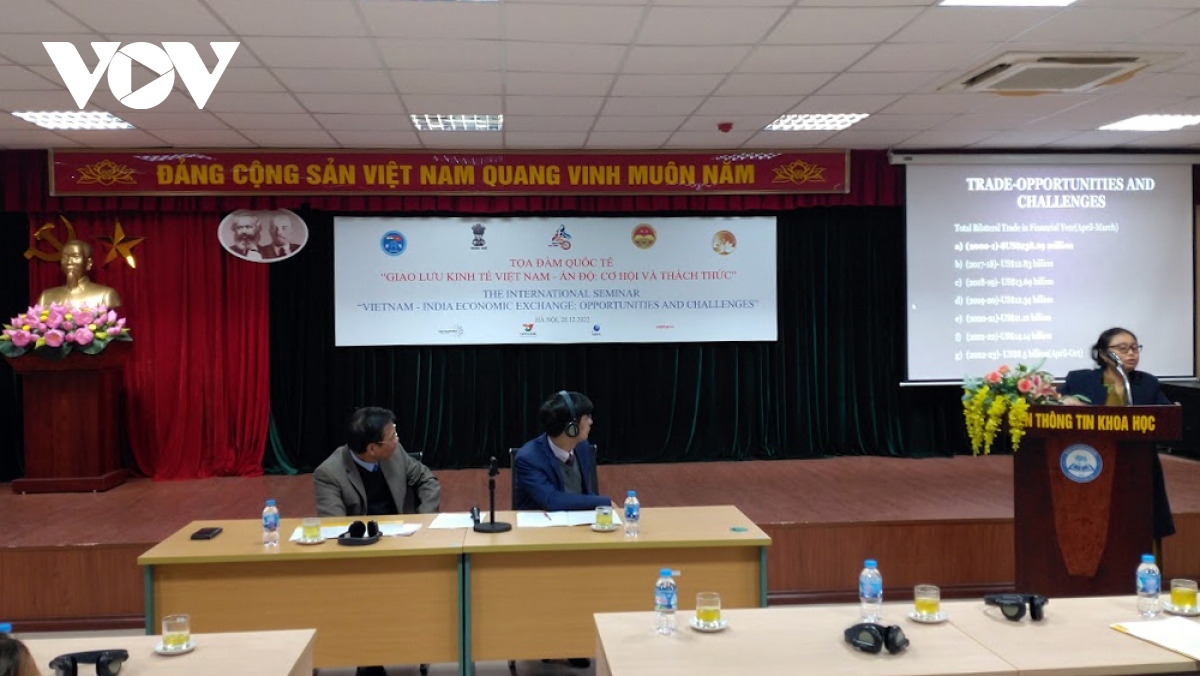Vietnam, India strive to bring trade turnover to over US$15 billion
VOV.VN - Vietnam and India must deepen their comprehensive strategic partnership, especially in terms of economic co-operation, to gradually bring the two-way trade turnover to more than US$15 billion, a figure which has been maintained for years.
These remarks were made by speakers at the international seminar “Vietnam-India economic exchange: Opportunities and challenges” which was recently held by the Centre for Indian Studies under Ho Chi Minh National Academy of Politics. The seminar was held in collaboration with the Vietnam-India Friendship Association in Hanoi and the Embassy of India in Hanoi.
Both countries first established their diplomatic ties in 1972, after 50 years with many enhancements, the two countries then officially become comprehensive strategic partners back in 2016.
The strong development of economic, trade, investment, defence, security, and cultural relations has so far created a solid foundation, opening up great prospects for both sides to continue promoting extensive co-operation in the near future.
As part of his welcome speech, Indian Ambassador to Vietnam Sandeep Arya affirmed that India's sound relationship with the country and other ASEAN member states will serve as a stable bridge for more effective investment co-operation in the future. In particular, with plenty of advantages and strengths of each country, the two sides will absolutely have many opportunities to open up fruitful co-operation in trade in the near future.
Expressing her goodwill, as well as her desire to focus on strengthening economic and trade linkages between India and Vietnam, Mini Kumam, First Secretary in charge of economics and trade of the Indian Embassy in Hanoi, stated that for many years India has boasted many advantages. These can be seen in industrial development, technology, finance, and medicine, with a series of large corporations being formed for stronger development and broader investment both inside and outside India.
She also noted that there are many potential fields of co-operation between the two sides, such as engineering and healthcare.
She said, “India is good in auto parts components, and tools for many agriculture or those used in scientific laboratories. Our machines and tools are quite good and affordable. Some studies showed that SMEs, which account for most businesses in Vietnam, are importing these types of machinery and tools from Europe. So, why don't we look at an Indian market?”
“Some studies showed that Vietnam, with nearly 100 million people, is spending almost $23 billion per annum on healthcare expenditures, about 6.5 per cent of the GDP. Meanwhile, 1.4 billion Indian people spend on healthcare expenses, about 2.1% of GDP. Why are Indians spending less? Because our drugs and medicines are very affordable and effective. We have been supplying the world including advanced economies. So, we have been requesting authorities also and businessmen to exploit this potential further," she added.
Indian businesses are willing to work alongside Vietnam and countries around the world as a means of improving investment efficiency, bringing favourable opportunities, as well as making large profits for businesses.
Trade collaboration will be really effective in the near future providing that businesses of the two countries strengthen their understanding of the market and work together to create valuable products for the world, she went on to say.
Many speakers at the seminar underlined the necessity of promoting discussions between the ministries, branches, and industry associations of the two countries as a way of proposing to relevant agencies and the Governments to swiftly negotiate and sign a new trade agreement between to boost trade turnover to a higher level.
Realising that the present is the right opportunity to strengthen joint economic ties and helping to quickly reach the potential that exists in terms of trade between the two countries, Vietnamese Ambassador to India Ton Sinh Thanh stated that the comprehensive strategic co-operation relationship, which is concretised by intensifying economic and commercial activities, is really a "duplicate of interests".
Bilateral trade co-operation has increased rapidly from US$200 million in 2000 to more than US$13 billion in 2021, with a target of US$15 billion set for this year.
Ambassador Thanh said, “I think the trade results are largely driven by the market's impulses, not really the government's measures. In fact, Vietnam and India only have one free trade agreement, the ASEAN-India Free Trade Agreement, which has been in effect since 2010.”
Linkages between both sides has great potential, although there is still many obstacles. Trade turnover remains significantly lower than that of Vietnam with other partners, including the United States and China, he added.
The diplomat also expressed his hope that the seminar will not only look into opportunities, but frankly point out challenges, as well as finding specific solutions, thereby enhancing the overall comprehensive strategic co-operation relationship, especially economic ties.
Kumam also stated that it is necessary to increase the sharing of potential and needs between the two markets, thereby allowing businesses to find more investment opportunities. In the immediate future, firms must find out more information about import and export conditions, mechanisms, and policies of the two countries to realise barriers and obstacles to make specific recommendations to leaders so they can create more opportunities for stronger investment ties moving forward.
From the perspective of enterprises operating in the Indian market, Doan Van Nhien, director of Vietnam Sandalwood Group, said that the Indian market has an array of opportunities for co-operation and investment.
However, he also pointed out the numerous difficulties in commercial activities in India. In particular, the process of applying for an investment license in India is fraught with many procedures, with the time to complete the operation license procedure taking up to nine months.
Participants at the seminar expressed their strong desire to see mutual trade links grow even stronger in the time ahead.


